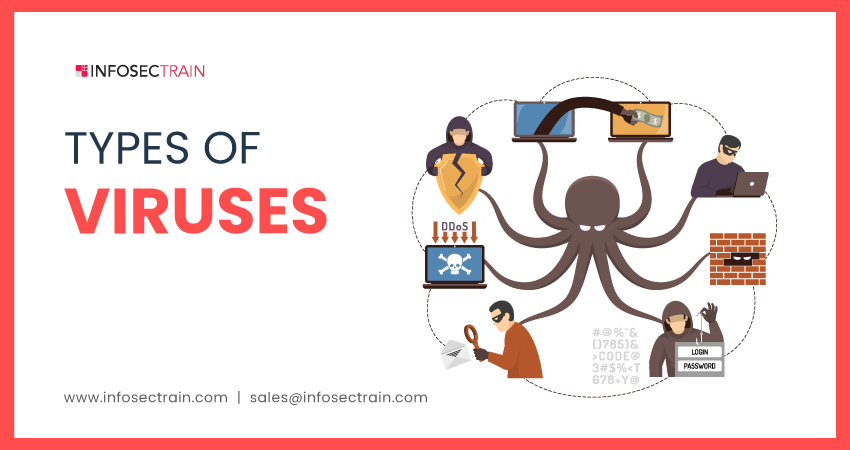Types of Viruses
Viruses are becoming increasingly prevalent every day in the digital world due to the widespread adoption of internet connectivity and other digital technologies that have created a vast and interconnected landscape where viruses can spread quickly and efficiently. As more people use social media and other online platforms, there are more opportunities for viruses to spread. Additionally, the evolving tactics and techniques used by malware creators and cybercriminals, such as social engineering and zero-day exploits, contribute to the proliferation of computer viruses.

What is a Virus?
Viruses are malicious software programs that replicate and spread themselves from one system to another. They attach themselves to legitimate files or programs and can cause damage by altering, corrupting, or deleting files, disrupting system functionality, stealing sensitive information, or granting unauthorized access to a system. Viruses often rely on human actions, such as opening malicious email attachments or downloading infected files, to propagate and infect new systems. They can also spread through removable media, network vulnerabilities, drive-by downloads, and social engineering.
Types of Viruses
Here are the list of different types of computer viruses:
1. Boot Sector Virus: Boot sector virus infect the boot sector of storage devices like hard drives and floppy disks. When an infected device is booted, the virus is loaded into memory, allowing it to infect other storage devices connected to the computer.
2. Browser Hijacker: The browser hijacker virus modifies browser settings, redirects searches, and displays unwanted ads. It aims to control user browsing behavior for malicious purposes.
3. Direct Action Virus: Direct action virus attaches itself to executable files and activates whenever an infected file is executed, spreading to other files in the same directory.
4. Encrypted Virus: An encrypted virus uses encryption techniques to hide its malicious code, making it difficult to detect by antivirus software and increasing its chances of successful infection.
5. File Infector Virus: File infectors infect executable files, such as .exe or .dll files, by embedding their code. Once the infected file is executed, the virus becomes active and can potentially infect other files.
6. Macro Virus: Macro viruses infect files that contain macros, such as documents or spreadsheets. When the infected file is opened, the macro virus executes its code, potentially causing damage.
7. Multipartite Virus: Multipartite virus infects the boot sector of a computer’s hard drive and executable files, making it difficult to remove.
8. Polymorphic Virus: A polymorphic virus can change its code or signature while maintaining its malicious function. It creates numerous slightly different copies of itself, making it more challenging to detect and remove by antivirus software.
9. Resident Virus: A resident virus embeds itself in the computer’s memory and remains active even after the infected program has finished executing, allowing it to infect other files and systems.
10. Web Scripting Virus: A web scripting virus exploits vulnerabilities in web scripting languages, such as JavaScript, to execute malicious code on websites and infect visitors’ devices with malware or steal their information.
How can InfosecTrain help?
Enroll in InfosecTrain‘s Certified Ethical Hacker (CEH) course to gain a solid understanding of viruses and other aspects of ethical hacking. We provide a well-structured curriculum, hands-on labs and exercises, expert-led instruction, and support to enhance your learning experience and boost your likelihood of success in the certification exam. We also provide resources like study guides, reference materials, and online platforms to supplement your learning journey.

TRAINING CALENDAR of Upcoming Batches For CEH v13
| Start Date | End Date | Start - End Time | Batch Type | Training Mode | Batch Status | |
|---|---|---|---|---|---|---|
| 31-May-2025 | 06-Jul-2025 | 19:00 - 23:00 IST | Weekend | Online | [ Open ] | |
| 07-Jun-2025 | 13-Jul-2025 | 09:00 - 13:00 IST | Weekend | Online | [ Open ] | |
| 21-Jun-2025 | 27-Jul-2025 | 19:00 - 23:00 IST | Weekend | Online | [ Open ] | |
| 06-Jul-2025 | 16-Aug-2025 | 09:00 - 23:00 IST | Weekend | Online | [ Open ] |






 1800-843-7890 (India)
1800-843-7890 (India)